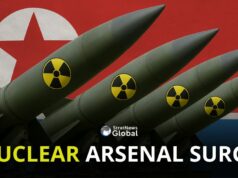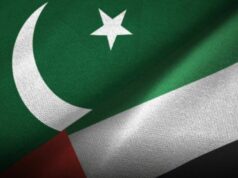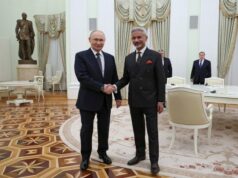President Vladimir Putin says Russia’s war in Ukraine is part of an existential struggle with the West that demands total focus – but deadly shootings in Dagestan show that militant Islam is a rising threat that may force him to redirect resources.
The latest violence, in which at least 20 people were killed on Sunday evening in a series of apparently coordinated shootings in Russia’s far south, raises awkward questions for its intelligence and security services.
They appear to have been caught off guard at a time when much of their attention is focused on Ukraine and the threat of Ukrainian-linked attacks inside Russia.
“Radical Islamism is again raising its head in Russia,” said Sergei Markov, a former Kremlin adviser, who had just returned from a trip to the North Caucasus region.
“It is clear that there is a problem with Islamist terrorism and it is very serious. We need action from the authorities.”
The reported involvement of two relatives of a local official who had held a counter-terrorism meeting as recently as April, and another attacker’s past affiliation with a pro-Kremlin party, have raised fears of infiltration of the local elite.
The deadly shootings in Dagestan, (in Derbent and Makhachkala), in which a Russian Orthodox priest and at least 15 policemen were killed and a synagogue was burned down, is a blow to Putin’s long-standing pledge to the Russian people that he will ensure domestic stability.
Residents of Makhachkala, the regional capital, on Tuesday reported much tighter security measures with more police patrols and vehicle checkpoints as the city observed a second official day of mourning.
The assaults may also prompt a review in Moscow of the way that impoverished majority-Muslim Dagestan is run, according to some experts.
The same region, some 1,600 km (1,000 miles) south of Moscow, was rocked in October when rioters shouting “Allahu Akbar” or “God is Greatest” stormed an airport to “catch” Jewish passengers on a flight from Tel Aviv.
Dagestan is important to the military, and a naval base for Russia’s “Caspian Flotilla” is being built there.
To its west lies Chechnya, also a majority-Muslim region, where Moscow has fought two wars with separatists since the 1991 collapse of the Soviet Union.
Riccardo Valle, Director of Research at The Khorasan Diary, a non-partisan centre that reports on militancy in the region, told Reuters that Islamic State and other jihadist groups had been discussing the opportunity that Russia’s war in Ukraine presented for them.
He said the Ukraine war had hindered essential cooperation between Moscow and the West on tackling Islamic State, as well as diverted Russian resources, and that the Dagestan attack showed “a huge security gap in Russian intelligence-gathering”.
Meanwhile, he said, jihadists had been “writing in articles about how Ukraine is the so-called ‘black hole’ for the West and Russia. Meaning that, while the West and Russia are focusing their attention in Ukraine, jihadists can take advantage of this situation and strike”.
With Reuters inputs
Thirty eight years in journalism, widely travelled, history buff with a preference for Old Monk Rum. Current interest/focus spans China, Technology and Trade. Recent reads: Steven Colls Directorate S and Alexander Frater's Chasing the Monsoon. Netflix/Prime video junkie. Loves animal videos on Facebook. Reluctant tweeter.




